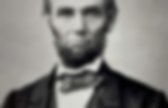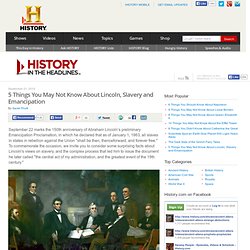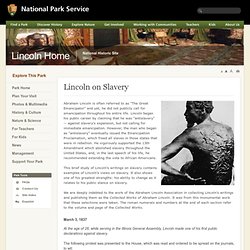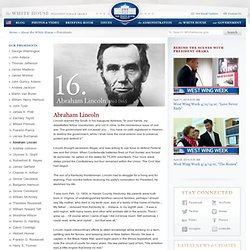

5 Things You May Not Know About Lincoln, Slavery and Emancipation. September 22 marks the 150th anniversary of Abraham Lincoln’s preliminary Emancipation Proclamation, in which he declared that as of January 1, 1863, all slaves in states in rebellion against the Union "shall be then, thenceforward, and forever free.

" To commemorate the occasion, we invite you to consider some surprising facts about Lincoln's views on slavery, and the complex process that led him to issue the document he later called "the central act of my administration, and the greatest event of the 19th century. " Depiction by Francis Bicknell Carpenter of Abraham Lincoln’s first reading of the Emancipation Proclamation, in July 1862. Lincoln on Slavery - Lincoln Home National Historic Site. March 3, 1837 At the age of 28, while serving in the Illinois General Assembly, Lincoln made one of his first public declarations against slavery.

The following protest was presented to the House, which was read and ordered to be spread on the journals, to wit: "Resolutions upon the subject of domestic slavery having passed both branches of the General Assembly at its present session, the undersigned hereby protest against the passage of the same. They believe that the institution of slavery is founded on both injustice and bad policy; but that the promulgation of abolition doctrines tends rather to increase than to abate its evils. They believe that the Congress of the United States has no power, under the constitution, to interfere with the institution of slavery in the different States. Abraham Lincoln. Lincoln warned the South in his Inaugural Address: "In your hands, my dissatisfied fellow countrymen, and not in mine, is the momentous issue of civil war.

The government will not assail you.... You have no oath registered in Heaven to destroy the government, while I shall have the most solemn one to preserve, protect and defend it. " Lincoln thought secession illegal, and was willing to use force to defend Federal law and the Union. When Confederate batteries fired on Fort Sumter and forced its surrender, he called on the states for 75,000 volunteers.